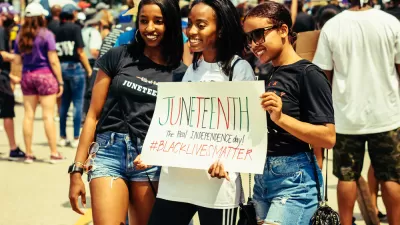Planning directors around the country have acknowledged the historic role of the planning profession in furthering the causes of racial discrimination and have publicly committed to change that history.

Twenty-one planning directors across the United States have signed a "Commitment to Change" that will refocus the profession of planning on equity. After acknowledging the historic role of the field of planning in contributing to racial inequity and discrimination, the statement commits to a number of actions, such as:
- Creating communities that are culturally diverse, livable, and accessible.
- Preserving, strengthening, and celebrating the culture, assets, institutions, and businesses of BIPOC communities.
- Promoting the health, economic, social, and cultural resilience of BIPOC communities.
- Championing housing choice and economic diversity.
- Addressing environmental injustice.
- Removing biases from their organizations.
An article by Oscar Perry Abello shares news of the commitment's publication, first acknowledging the discriminatory history of planning. "Today’s city planners, whether they realize it or not, have inherited zoning ordinances and comprehensive plans and building codes and built environments that generations of predecessors have infused with implicit and sometimes very explicit racism," writes Abello.
Abello centers the article on Eleanor Sharp, adjunct professor for planning and community development at Temple University and executive director of the Philadelphia City Planning Commission, one of the 21 planning directors around the country to sign the joint statement, which also invited their peers around the country to join them in the effort.
As noted in the article, some institutions of the planning profession have already expressed solidarity in working toward equity. "The American Planning Association spent a few years convening its Planning for Equity Policy Guide Working Group, co-chaired by planners Lynn Ross and Susan Wood. (Ross is also a Next City board member). That working group produced the Planning for Equity Policy Guidebook, ratified by the association’s board in 2019," explains Abello.
Other planning directors cited for soundbites in the article are Laura Aldrete, executive director of Denver Community Planning and Development; Emily Liu, director of Louisville Metro Planning and Design Services; and Peer Chacko, chief planning officer and director of the Dallas Planning and Urban Design Department. The complete list of signatories, as of the commitment's publication on October 5, is as follows:
- Tim Keane, Commissioner, City Planning, Atlanta, GA
- Chris Ryer, Director, Planning, Baltimore, MD
- Brian Golden,Director of Planning, Planning and Development, Boston, MA
- Taiwo Jaiyeoba, Assistant City Manager and Director, Planning, Design and Development, Charlotte, NC
- Peer Chacko, Chief Planning Officer and Director, Planning and Urban Design, Dallas, TX
- Laura Aldrete, Executive Director, Community Planning and Development, Denver, CO
- Alex Hoffman, Assistant Director, CID Planning, El Paso, TX
- Margaret Wallace Brown, Director, Planning and Development, Houston, TX
- Vince Bertoni, Director, City Planning, Los Angeles, CA
- Emily Liu, Director, Metro Planning and Design Services, Louisville, KY
- John Zeanah, Director, Division of Planning and Development, Memphis, TN
- Lucy A. Kempf, Executive Director, Planning, Nashville/Davidson County, TN
- Anita Laremont, Executive Director, City Planning, New York, NY
- Eleanor Sharpe, Executive Director, City Planning Commission, Philadelphia, PA
- Andrea Durbin, Director, Planning and Sustainability, Portland, OR
- Bridgett White, Planning Director, Planning and Community Development, San Antonio, TX
- Mike Hansen, Director, Planning, San Diego, CA
- Rich Hillis, Director, Planning, San Francisco, CA
- Rico Quirindongo, Interim Director, Planning and Community Development, Seattle, WA
- Donald Roe, Executive Director, Planning and Urban Design, St. Louis, MO
- Andrew Trueblood, Director, Planning, Washington, DC
FULL STORY: In Open Letter, City Planning Agencies Acknowledge Their Racist History and Pledge to Do Better

Alabama: Trump Terminates Settlements for Black Communities Harmed By Raw Sewage
Trump deemed the landmark civil rights agreement “illegal DEI and environmental justice policy.”

Planetizen Federal Action Tracker
A weekly monitor of how Trump’s orders and actions are impacting planners and planning in America.

The 120 Year Old Tiny Home Villages That Sheltered San Francisco’s Earthquake Refugees
More than a century ago, San Francisco mobilized to house thousands of residents displaced by the 1906 earthquake. Could their strategy offer a model for the present?

In Both Crashes and Crime, Public Transportation is Far Safer than Driving
Contrary to popular assumptions, public transportation has far lower crash and crime rates than automobile travel. For safer communities, improve and encourage transit travel.

Report: Zoning Reforms Should Complement Nashville’s Ambitious Transit Plan
Without reform, restrictive zoning codes will limit the impact of the city’s planned transit expansion and could exclude some of the residents who depend on transit the most.

Judge Orders Release of Frozen IRA, IIJA Funding
The decision is a victory for environmental groups who charged that freezing funds for critical infrastructure and disaster response programs caused “real and irreparable harm” to communities.
Urban Design for Planners 1: Software Tools
This six-course series explores essential urban design concepts using open source software and equips planners with the tools they need to participate fully in the urban design process.
Planning for Universal Design
Learn the tools for implementing Universal Design in planning regulations.
Clanton & Associates, Inc.
Jessamine County Fiscal Court
Institute for Housing and Urban Development Studies (IHS)
City of Grandview
Harvard GSD Executive Education
Toledo-Lucas County Plan Commissions
Salt Lake City
NYU Wagner Graduate School of Public Service





























